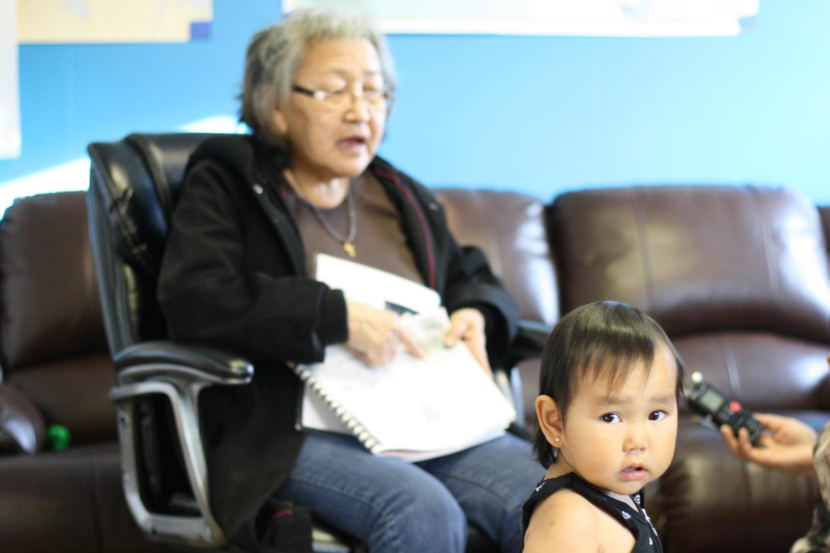
A mother and daughter attended a four-day language institute at University of Alaska in May, which coincided with the Alaska legislature’s April declaration of a linguistic emergency for Alaska Native languages.
Southwest Region Schools Yup’ik studies director Arnaq Esther Ilutsik said that the sheer number of languages in Alaska present a particular challenge because they are spread across many regions with different needs.
This is mirrored in Yup’ik-speaking regions.
“We have such a huge region that there are three different parts,” she said. “There’s the northern Yup’ik, off the Yukon River. There’s the Kuskokwim Yup’ik, which is more central, and they’re the strongest speakers of the central Yup’ik language. And then there’s the Bristol Bay area, where we’re the weakest link. We have a lot to do to strengthen our own languages in our communities.”
At the workshop, two delegations – from Hawai’i and the Mohawk Nation – discussed efforts to revitalize and sustain their communities’ Native languages with over 100 attendees.
The workshop also addressed the historical trauma some associate with indigenous language, one result of the boarding schools many Alaska Native children were forced to attend through the 1970s.
“Language and culture were not allowed in the schools until the 1970s. When my late father, in the 1930s, George H. Ilutsik, went to school – he hardly went to school because he was a reindeer herder – but during that time he was learning English. He was learning the American holidays, and they were disregarding their own celebrations.”
Even after Yup’ik was reintroduced in schools, Esther Ilutsik said that it was taught through an English lens.
“We didn’t practice our own celebrations. Going to school, we were punished for speaking our language. In the 1970s, they said, ‘Yes, it’s OK to teach the language and culture in the school. But when they first created the materials, the materials were based on things that were taught in English, like ‘Twinkle, twinkle little star.’”
According to Ilutsik and her daughter Atkiq Michelle Ilutsik Snyder, teaching Yup’ik through English, rather than through Yup’ik is a problem.
Public platforms like radio can provide the public with conversation that shows how the language flows.
John Active produced and hosted a Yup’ik show on KYUK starting in the 1970s. He passed away shortly after his retirement in April.
“He wanted to ensure that his Yup’ik elders understood what was going on in the world,” Esther Ilutsik said. “That was his first motivation. But then you read and hear a lot of the stories that he shares, and that’s the grounding: our Yup’ik foundation.”
“I think it’s really important that we acknowledge the language of the place that we are living in,” said Ilutsik Snyder, a doctoral student in the University of Alaska Fairbanks’s indigenous studies program. “For us living here in Dillingham and in this region, it’s Yup’ik. Yup’ik people have been living here for time immemorial. And for so long we’ve been expected to assimilate and function through English, to function in an English-speaking world. There’s been no consideration for those whose first language is Yup’ik, who would like to continue to speak Yup’ik. There has been nothing available for them.”
A lack of basic platforms needed to begin is one of the biggest roadblocks to building a framework for language revitalization, Esther Ilutsik said.
“I think one of the things that we really need to look at is community engagement. One of the Hawai’ians said, ‘It is the responsibility of the schools to bring our language back.’ It is the schools’ responsibility to bring the language back to the communities, but we also need community engagement.”
She said that this would provide a foundation from which language revitalization efforts could grow.
